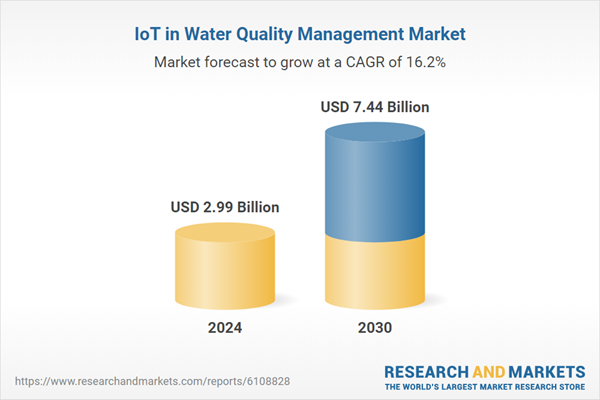Speak directly to the analyst to clarify any post sales queries you may have.
10% Free customizationThis report comes with 10% free customization, enabling you to add data that meets your specific business needs.
As urban populations expand and water scarcity intensifies, governments and private stakeholders are investing in connected infrastructure to ensure water safety, optimize treatment processes, and comply with environmental regulations. Furthermore, the integration of IoT with AI, cloud computing, and big data analytics is enabling predictive maintenance and early detection of pollution events, which enhances response capabilities and reduces operational costs. These developments are expected to accelerate the deployment of IoT solutions in water quality management worldwide.
Key Market Drivers
Rising Global Water Pollution Levels
The increasing contamination of freshwater resources is a key factor driving demand for IoT-based water quality monitoring. With over 80% of global wastewater being discharged untreated, real-time monitoring has become essential to track pollutants and ensure compliance with regulatory standards. IoT sensors and platforms allow early detection of contaminants such as nitrates, heavy metals, and pathogens, helping utilities and industries respond swiftly to potential threats. Countries like India and China are adopting smart monitoring technologies in urban centers, while developed economies such as the United States are leveraging IoT to oversee aging water infrastructure. The ability of IoT systems to transmit data at intervals of just a few seconds enables high-accuracy, real-time reporting, improving transparency and public health outcomes.Key Market Challenges
High Initial Investment and Operational Costs
Despite the operational efficiencies and regulatory benefits offered by IoT in water quality management, the high capital expenditure required for implementation remains a significant barrier. Deploying sensors, communication networks, cloud platforms, and analytics tools involves substantial upfront costs. Additionally, integration with existing legacy infrastructure - particularly in older municipal systems and industrial plants - can be complex and expensive. Ongoing operational costs, such as calibration, data subscriptions, and skilled technical support, further add to the financial burden. These challenges are particularly pronounced in small utilities and developing regions, where budgets for advanced technology deployment are often limited.Key Market Trends
Shift Toward Cloud-Based Water Monitoring Platforms
The market is witnessing a strong shift from traditional on-premise systems toward cloud-based platforms for water quality monitoring. Cloud-enabled IoT solutions offer scalable data storage, centralized management, and remote access, making them especially useful for monitoring multiple sites across vast geographic areas. This trend supports faster decision-making in response to pollution events, equipment failures, or environmental changes. In 2023, nearly half of all global IoT-based water monitoring deployments featured either fully cloud-based or hybrid architectures. Major players like Siemens, Schneider Electric, and Xylem are offering cloud-native platforms with integrated analytics, customizable dashboards, and real-time alerts. This evolution enhances the efficiency and flexibility of water quality management across sectors.Key Market Players
- Xylem Inc.
- ABB Ltd.
- Siemens AG
- General Electric
- Honeywell International Inc.
- Danaher Corporation
- Schneider Electric SE
- Libelium
- Badger Meter Inc.
- Trimble Inc.
Report Scope:
In this report, the Global IoT in Water Quality Management Market has been segmented into the following categories, in addition to the industry trends which have also been detailed below:IoT in Water Quality Management Market, By Component:
- Hardware
- Software
- Services
IoT in Water Quality Management Market, By Deployment Mode:
- On-Premises
- Cloud-Based
- Hybrid
IoT in Water Quality Management Market, By End-User:
- Municipal
- Industrial
- Residential
- Commercial
- Agricultural
IoT in Water Quality Management Market, By Region:
- North America
- United States
- Canada
- Mexico
- Europe
- Germany
- France
- United Kingdom
- Italy
- Spain
- South America
- Brazil
- Argentina
- Colombia
- Asia-Pacific
- China
- India
- Japan
- South Korea
- Australia
- Middle East & Africa
- Saudi Arabia
- UAE
- South Africa
Competitive Landscape
Company Profiles: Detailed analysis of the major companies present in the Global IoT in Water Quality Management Market.Available Customizations:
With the given market data, the publisher offers customizations according to a company's specific needs. The following customization options are available for the report.Company Information
- Detailed analysis and profiling of additional market players (up to five).
This product will be delivered within 1-3 business days.
Table of Contents
Companies Mentioned
- Xylem Inc.
- ABB Ltd.
- Siemens AG
- General Electric
- Honeywell International Inc.
- Danaher Corporation
- Schneider Electric SE
- Libelium
- Badger Meter Inc.
- Trimble Inc.
Table Information
| Report Attribute | Details |
|---|---|
| No. of Pages | 185 |
| Published | July 2025 |
| Forecast Period | 2024 - 2030 |
| Estimated Market Value ( USD | $ 2.99 Billion |
| Forecasted Market Value ( USD | $ 7.44 Billion |
| Compound Annual Growth Rate | 16.2% |
| Regions Covered | Global |
| No. of Companies Mentioned | 10 |









